Tooth extractions are a common dental procedure used to remove teeth that are severely damaged, decayed, or impacted. This involves the dentist using specialized tools to loosen the tooth from its socket in the jawbone and remove it from the mouth.
Tooth extractions can be performed for various reasons, and the duration of the procedure can vary depending on the complexity of the extraction. This article will discuss the process of a tooth extraction from start to finish, including what types of extractions are available, what to expect during the procedure, and how long it takes.
Additionally, it will provide information on the recovery time and aftercare for tooth extraction, as well as the potential risks associated with the procedure.
What is a Tooth Extraction?
A tooth extraction is a procedure used to remove a single tooth or multiple teeth from the mouth. During the extraction, the dentist or oral surgeon uses a local anesthetic to numb the area, which helps to reduce any severe pain.
The dentist or oral surgeon will carefully remove the tooth and surrounding gum tissue during the procedure. After the extraction, the dentist or oral surgeon will place a gauze pad in the area to help form a blood clot, which helps to protect the socket and promote healing.
In some cases, tooth removal may require a surgical extraction. This type of extraction is used when a tooth is impacted, such as with wisdom teeth, or when a regular extraction is not possible. This type of extraction is more involved and may require stitches or the use of special instruments.
The healing time for extraction can vary depending on the type of extraction and the individual’s dental health. Generally, a simple extraction can take a few days to a few weeks to heal, while a surgical extraction can take up to a few months.
Complications such as dry sockets can occur, so it is important to follow all instructions from the dentist or oral surgeon regarding recovery and aftercare.
What Types of Tooth Extractions Are Available?
Remarkably, several varieties of dental extraction are available, ranging from simple to complex.
The most common type of extraction is a simple extraction, which removes a tooth visible in the mouth. This procedure can typically be completed in a few minutes, and patients can usually go home shortly afterwards.
After the extraction, patients should be instructed to eat soft foods and to avoid smoking or drinking through a straw. In addition to a simple extraction, a more complicated extraction may be needed for a tooth that is broken or impacted.
Wisdom tooth removal is an example of complex extraction and may require a local anesthetic or even a general anesthetic. This type of extraction is more of a surgical procedure, as it may involve the removal of bones or other tissue. The procedure can take several hours in these cases and may require a hospital visit.
After any extraction, a piece of gauze should be placed on the site for up to an hour. In some cases, nitrous oxide may help reduce pain and anxiety.
For the first 24 hours after the tooth extraction, patients should rinse their mouth with warm salt water and avoid spitting, drinking through straws, or smoking.
What Should I Expect During a Tooth Extraction?
Undergoing a tooth extraction requires preparation and knowledge of the process. Patients should be aware of the type of tooth extraction they are undergoing, the sedation options available, the recovery process, and the risk of complications.
An oral surgeon will typically perform a tooth extraction. Depending on the type of tooth extraction, the procedure can take anywhere from a few minutes to an hour. The tooth extraction process can be done in one appointment or may require several visits with the oral surgeon.
During the appointment, the patient will have the opportunity to discuss sedation options and the risks of complications with the oral surgeon.
Patients should expect to experience some pain and discomfort after the procedure and should discuss treatment options with their oral surgeon. Recovery times may vary depending on the tooth extraction type and the patient’s overall health. It is important to follow any instructions the oral surgeon provides to ensure a successful recovery with minimal pain and discomfort.
How Long Does A Tooth Extraction Take?
The duration of a tooth extraction can vary significantly, depending on the complexity of the procedure. Additional teeth, gum disease, and severe tooth decay may contribute to a longer extraction time. The type of tooth, whether visible or not, and whether it is a single root or adjacent tooth, can also have an effect. During the extraction, excessive bleeding can also add to the time it takes to complete the procedure. Finally, the healing process must be considered when considering the length of tooth extraction.
Oral health is an important factor when undergoing dental procedures, including tooth extraction. Maintaining good oral hygiene before and after a tooth extraction is essential to ensure a smooth recovery. Following the advice of a dentist and avoiding activities that can cause excessive bleeding, such as smoking and drinking, can also help speed up the healing process.
In addition, proper post-operative care is essential for a successful recovery. This includes taking prescribed medications, avoiding hard or crunchy foods, and keeping the extraction site clean. Following these steps can help minimize the risk of infection and reduce the time it takes to heal.
What is the Recovery Time for a Tooth Extraction?
Recovery time following a tooth extraction will depend on the complexity of the procedure and the individual’s oral hygiene. Generally, the recovery time after extracting natural teeth is shorter than after removing broken or overcrowded teeth.
After a tooth extraction procedure, it is common for the patient to experience some pain or swelling in the area around the tooth socket. To reduce the risk of painful complications, following the dentist’s instructions regarding post-operative care is important.
There are several steps to ensure a successful recovery after tooth extraction. These include:
- Avoiding crunchy foods for the first few days after surgery
- Keeping the area clean by gently rinsing with warm salt water
- Taking any prescribed pain medication
- Refraining from drinking through a straw for the first 24 hours
The recovery time for tooth extraction can vary depending on the tooth extraction type. For instance, the recovery time for an infected or overcrowded tooth may take longer than for a simple natural tooth extraction. In any case, it is important to follow the instructions given by the dentist to ensure a safe and successful recovery.
How to Care for Your Mouth After a Tooth Extraction
After tooth extraction, proper mouth care is essential for a successful recovery. A dental surgeon may perform a tooth extraction to treat crowded teeth, prepare for a root canal treatment, or remove a tooth damaged beyond repair. Depending on the type of anesthesia used, a patient can expect to feel some discomfort or pain in the extraction area. Therefore, it is important to follow post-operative instructions provided by the dental surgeon.
Keeping the extraction site clear of food debris is important to prevent infection. Eating only healthy foods for the first few days after tooth extraction is also important. Soft, cold foods, such as yogurt, applesauce, and pudding, are recommended for the first few days. As the healing progresses, patients may gradually move on to solid foods.
However, avoiding hard, crunchy foods, such as popcorn, chips, and nuts, is important for several weeks after the extraction. Patients should follow the instructions given by their dental surgeon to ensure that the healing process is successful. In addition to following the instructions of the dental surgeon, patients should be mindful of the type of food they consume, especially in the weeks after molar extraction. Eating healthy and avoiding hard, crunchy foods can help ensure the mouth heals properly.
Are There Any Risks Involved With Tooth Extractions?
While tooth extractions can be a necessary and successful procedure, they have certain risks. These risks include:
- average time of the procedure taking longer than expected
- extra time is needed to remove bone tissue
- severe gum disease
- dental professional not adequately numbing the area
- the sensation of pressure leading to dental anxiety.
The best way to reduce the risks associated with tooth extractions is to ensure the dental professional follows the correct steps and that the patient is adequately informed beforehand.
To ensure the procedure is successful, the patient should inform the dental professional of any dental anxiety and express any concerns before the procedure. The patient should also be aware of the average time the procedure should take and any extra time needed to remove bone tissue. Lastly, the patient should ensure the area is adequately numbed before the procedure commences, and if there is any sensation of pressure, the patient should inform the dental professional.
Following a successful tooth extraction, it is important to attend the follow-up appointment and follow the instructions provided by the dental professional to reduce the risk of any further dental treatments being required. Furthermore, following the instructions the dental professional provides can help reduce the risk of infection and ensure the wound heals properly.
Key Takeaways
The tooth extraction process may seem daunting, but it can be a successful procedure with the right preparation and care.
Tooth extractions have been used for centuries, and the process is relatively simple. While the length of the procedure will vary depending on the type of extraction, most take less than half an hour.
The recovery time for tooth extraction is typically short, and some simple steps can be taken to ensure that the mouth is properly cared for afterwards.
Despite its simplicity and relative safety, tooth extraction can be risky, and it is important to consult a dental professional to assess the risks associated with the procedure.
If you are considering a tooth extraction, talking to a dental professional is important. Sutherland Dental is ready to provide quality, comprehensive care for you in Sutherland, NSW. Our experienced team can assess your situation and provide you with the best action. Contact us today for a consultation to discuss your needs and determine the best option.



